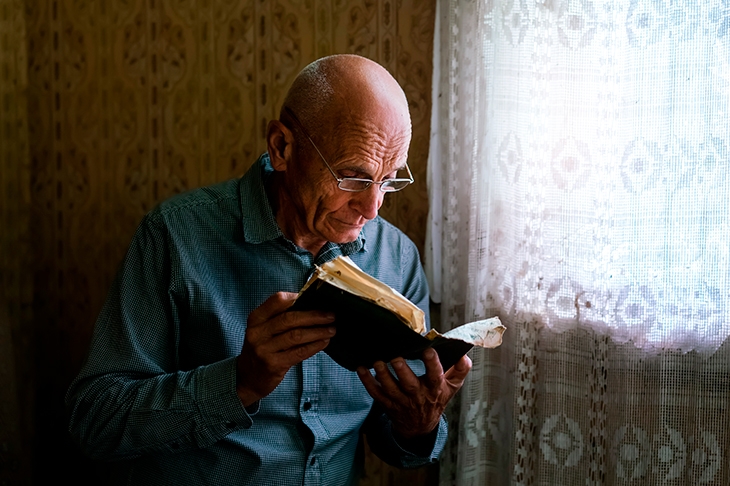There are several cave houses built into the cliff. Ours is the highest and can be reached only by a precipitous footpath with a lot of puffing and panting. The postbox is at the foot of the path, but occasionally the postman carries up something or other that needs to be signed for. When you go to the door to answer his knock, you find him doubled over, his hands on his knees, pouring with sweat, gasping pitifully, unable to speak. Guests likewise.
The path up to the house is a public footpath that is part of a tourist trail called ‘Visit the Grottos’. One pays €2 at the tourist information office down in the town and in return you get a map with a dotted line on it showing you where to go. Apart from a Napoleonic hospice further along, and a few caves that were once dwellings, there isn’t much to see. Further down the path, however, there is a reconstruction, behind bars, of a cave dwelling, furnished in a rudimentary fashion, as it might have looked before the earth tremor of 1905 wrecked the 20 or so houses that clung to the cliff face.
I went to investigate and found an elderly man studying the books on my bedside cabinet
In summer fitter tourists make it to the top and we often see their faces peering in at our windows, trying to decide whether our interior is meant to be another council-sponsored representation of an impoverished 19th-century troglodyte family home, or what.
The house has three storeys. The lower two are caves connected by a ladder, the third is a bedroom supported on rafters. I have a desk in the bottom cave; the living room and kitchen are in the cave above. The other day I was at my desk at the bottom when I fancied another cup of coffee. So I climbed the ladder into the living room, and another short ladder into the kitchen, and put the kettle on. While waiting for it to boil I heard someone moving about in the bedroom above. As far as I knew I was alone in the house, so I mounted the stairs to see who or what was clomping about up there. I found an elderly man investigating the books on my bedside cabinet. I don’t know which of us was the more surprised.
He was tall for an elderly man and he faced me without embarrassment, was glad to see me even. Perhaps he thought I was a volunteer curator who could answer any questions he might have. ‘Bonjour, Monsieur,’ I said. In halting French he told me that in the past hour he had become separated from his wife. Had I seen her? He described her as wearing a blue coat and hiking boots and being roughly his age, about 80. I said, in my equally halting French, that I was sorry but I hadn’t, though perhaps she was downstairs in the bathroom, which was the only room I hadn’t seen lately. ‘Do you speak English?’ he said. ‘I am English,’ I said. ‘Then would you mind if we spoke in English?’ ‘I’d much prefer it,’ I said.
‘And this is the bedroom,’ I said. ‘The books you are looking at are mostly from the 1950s and 1960s. And this swing mirror here is, I think, from the 1930s.’ He turned and regarded himself in the mirror and me over his left shoulder. ‘I’m Canadian,’ he said, addressing our reflections. ‘And so is my wife. I wonder where she could have got to? We love it here. We’ve been coming here for 25 years. As a matter of fact, we have a little house here in…’ He seemed to forget for a moment where we were. ‘France?’ I suggested. In the mirror he looked coquettishly at me, as if I were pulling his leg. ‘France? I don’t think so.’ I maintained that it was France. ‘Which part of France?’ he said, interestedly. ‘Provence,’ I said. He laughed. ‘I don’t think so. Now I wonder where my wife has got to. You’re sure you haven’t seen her?’
I suggested we went downstairs to look for her and led the way. I advised caution, adding that the dog had fallen down these stairs only the other day and broken her leg. At the bottom I shepherded him down the short ladder into the cave that was also the living room and showed him the front door.
‘Well, we made it,’ he said. ‘And now I really must be going and it was lovely to meet you. You really must come and visit us the next time you are in… Where did you say we are now?’ I stated the name of the village. ‘In France, you said?’ ‘France. I’m certain of it,’ I said. He laughed again. ‘Well, so nice to have met you. Cheerio!’ And with that he tottered off down the path.







Comments